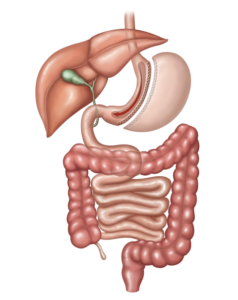Sleeve Gastrectomy
The sleeve gastrectomy is a restrictive procedure that reduces the size of the stomach and limits food intake. This can help obese patients to lose weight when other methods were ineffective.
A Sleeve Gastrectomy greatly reduces the size of your stomach and limits the amount of food that can be eaten at one time.
 Laparoscopic Sleeve Gastrectomy (LSG) is a restrictive and metabolic procedure that causes weight loss by creating physical and chemical changes in the body.
Laparoscopic Sleeve Gastrectomy (LSG) is a restrictive and metabolic procedure that causes weight loss by creating physical and chemical changes in the body.
The operation was originally performed years ago as the first part of a two part procedure in very high risk patients. The objective was to enable the patient to lose weight with the sleeve first and when they were less high risk, to convert the sleeve to a gastric bypass or other procedure for further weight loss. The sleeve operation has been modified over the years and is now a stand-alone procedure with excellent extreme weight loss results.
How is gastric sleeve surgery performed?
We perform the sleeve gastrectomy as a laparoscopic procedure. This involves making five or six small incisions in the abdomen and performing the procedure using a video camera (laparoscope) and long instruments that are placed through these small incisions.
During the Laparoscopic Sleeve Gastrectomy, about two-thirds of the stomach is removed using a stapling device leaving a narrow gastric “tube” or “sleeve”. No intestines are removed or bypassed during the sleeve gastrectomy. The LSG takes one to two hours to complete. Most patients are in the hospital overnight and back to work in 2 weeks. Full recovery may take up to 3-4 weeks. The postoperative care is very similar to gastric bypass.
How Does Gastric Sleeve Surgery Cause Weight Loss?
Gastric sleeve surgery is a restrictive and metabolic procedure. It greatly reduces the size of your stomach and limits the amount of food that can be eaten at one time. It does not cause decreased absorption of nutrients or bypass your intestines. After eating a small amount of food, you will feel full very quickly and continue to feel full for several hours.
The sleeve gastrectomy works chemically by changing the signals that the stomach sends to the rest of the body, including the brain. These signals in the body control blood sugar levels, increase feelings of fullness, decrease hunger and affect how the body processes and stores the calories from food.
Average weight loss is between 50-65% of your excess body weight.
What Are The Risks Of Laparoscopic Sleeve Weight Loss Surgery?
There are risks that are common to any laparoscopic procedure such as bleeding, infection, blood clot formation, injury to other organs, or the need to convert to an open procedure. There is also a small risk of a leak from the staple line used to divide the stomach. These problems are rare and major complications occur less than 1% of the time. Other complications can also occur.
Some early side effects may include nausea, heartburn, and regurgitation if you eat too quickly or too much. It is not reversible.
Sleeve gastrectomy advantages:
- Rapid initial weight loss
- No re-routing of intestines – Food passes through the digestive system in the usual order
- No postoperative adjustments are required
Sleeve gastrectomy disadvantages:
- Nonreversible since part of the stomach is removed
- Rapid weight loss can increase gallstone formation
- Not as much long term data as other bariatric surgeries
- Although rare, leaks can be more challenging to manage than in gastric bypass
Our sleeve gastrectomy patients come to us from Burlington, Greensboro, High Point, Kernersville, Winston-Salem and neighboring areas. Schedule your online or live seminar to learn more and get started with our bariatric weight loss program.